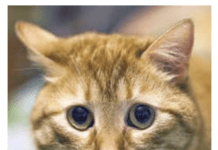You come in after a long day and plop down on the couch. Your cat jumps up and snuggles up against you. You reach over and pull her onto your lap. And then she jumps off. Doesnt she love you?
She does, but you must understand the nature of a cats affection. Although there isnt extensive research in this area, experts have observed some very intriguing
features about affectionate behavior in cats.
Like Cat, Like Person
What most people dont realize is that cats express affection towards people the same way as they do towards other cats, says Karen Overall, VMD, board certified animal behaviorist at the University of Pennsylvania. Signs of affection from your cat include rubbing against your legs or outstretched hand (enabling your cat to mark you with his scent), nose touching (a form of greeting between cats), licking, purring, and squinting of the eyes, which is like a cat smile.
Cats will sometimes pat you, says Overall. I had a Siamese cat who used to pat each side of my face.
There are also certain positions that indicate affection. With each other, cats will often lie rear to rear with their tails entwined, says Vint Virga, DVM, a board certified veterinary behaviorist in Newport, Rhode Island. So if your cat lies next to you like this – with his rear towards you-he is being affectionate.
Sometimes we encourage our cats to be affectionate in a certain way – and then were disappointed when it doesnt happen. For example, your cat may lie next to you and lick you – which clearly means she likes you – but she wont allow you to pick her up and hold her. Instead, she struggles to get down. Dont be offended. Remember, cats usually express affection toward their human friends in the same manner as they do toward their feline peers. Not many cats are picked up and held by other cats! So when you do, youre asking your cat to enjoy a position to which she is unaccustomed.
Some cats will sit on your lap but resist a lot of petting. But its all individual, says Virga. There are some cats who do seem to crave affection of all kinds – stroking, holding, being carried around. It really depends a lot on the cats
personality, he says.
Breed and Personality Bonding
Are some breeds more affectionate than others? Theres no hard data, but some cats seem to have been bred for their affectionate behavior, says Overall. Abyssinians are very friendly, she says. So are Siamese and the Oriental cats, such as Burmese and Somali.
Some people will tell you that no cat is friendlier than a tomcat, says Overall. In general, though, females stay closer to home and may be viewed as more affectionate than males who wander, especially fertile males. The exception with females is when they are caring for a litter. Then they focus most of their energy on protecting their babies and may seem less affectionate toward people.
But Overall agrees with other experts that a cats own personality ultimately determines his or her level of affection. Some cats, as people, like a lot of physical contact while others need less touching and more space. Likewise, some cats will be affectionate on their own terms – only when they want to be – while others will readily respond to your overtures.
Learning to Be More Affectionate
Experts agree – although it is not scientifically based – it is possible for a cat to become more affectionate as the relationship develops, says Virga. This holds true for a relationship with a person or another cat or another animal. Cats often learn to be affectionate because they enjoy what comes with this behavior, such as the return of affection and greater acceptance by their human companions.
With time, you can help cats become more accustomed to being touched, says Virga. But this is more of a behavioral change and not necessarily an expression of real affection. Sometimes you have to realize, says Virga, that your cats level of affection may be fine; it could be your expectations that may be too high.
The Cuddly Kitten and the Affectionate Cat
There are some characteristics in kittenhood that can indicate how likely your cat will be an affectionate companion. Genetic studies show that if the kittens father is extremely outgoing, the kitten has an increased chance of being very friendly, says Overall.
Another factor to look at (but not always possible) is the mothers nutritional status during pregnancy. Kittens who are well nourished in utero are more likely to have a friendly disposition. Finally, kittens that are taken away from their mothers and siblings when they are fully weaned – about 8-1/2 weeks – have learned socialization skills with other cats and may be able to transfer this experience to households with people. You want the kitten who plays a lot and who, at 7 or 8 weeks, is not timid, says Overall. This is the one you should pick.
When Your Cat Is Too Affectionate
Some cats are all over their human companions, jumping on their laps every time they sit down, lying on them at night and not letting them sleep, or tripping them as they walk because they constantly want attention. Says Virga, When a cat latches on to one person in a household, this may indicate the cat is not generally receiving enough stimulation in his or her environment. In other words, your cat may be bored.



